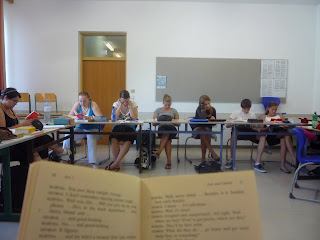Who's Afraid of Virginia Woolf?
[Reading Who's Afraid of Virginia Woolf]
Edward Albee
Born in 1928 – parents´identity unknown, adopted at the age oft wo weeks by the Albees-
Grew up in this wealthy family in New York City – private tutors, servants, …
Family moved around a lot- Albee attended great variety of schools, left Trinity College after sophomore year
In 1950 he moved to Greenwich Village: centre of artistic freedom, bohemians,….Albee had started writing early (first play at the age of 12) and did all kinds of odd jobs (salesman, office boy,…)
First worldwide success: “The Zoo Story” 1958 : one-act play that was staged in West Germany first
Influenced by playwrights likeTennessee Williams and Arthur Miller, who used a realistic idiom,
but also by the new movement at drama writing: the Theatre of the Absurd:
speech is often deliberately confusing, it seems that humans had lost control of their lives and are faced with a certain hopelessness- humor is a relief
Important representatives of the Theatre of the Absurd:
Samuel Beckett (born 1906 Ireland) “Waiting for Godot”, “Happy Days”, wrote in English and French
Eugène Ionesco (born 1909 Romania) “The Bald Soprano”, “The Lesson”, “The Chairs” (French)
Edward Albee´s work is often seen as a link between the realistic theatre and the Theatre of the Absurd
He has, among others, received three Pullitzer Prizes and is currently teaching playwriting courses at the University of Houston
“Who ´s Afraid of Virginia Woolf?” - title refers to the song “Who´s Afraid of the Big Bad Wolf”(reality or communism ?) and the British novelist Virginia Woolf (1882-1941) , who used stream-of-consciousness technique in works like “Orlando”, “To the Lighthouse”, “Mrs. Dalloway”, “A Room of One´s Own” (quote: "A woman must have money and a room of her own if she is to write fiction."
The play opened on Broadway in 1962-
Historical background.
John F. Kennedy, the youngest man ever elected President, was in office,
Traditional values seemed to be unshakable in the US, but the country was about to undergo a great turmoil: the Vietnam War, the assassinations of President Kennedy, Senator Robert F. Kennedy, and Reverend Martin Luther King, Jr.
American relations with the Soviet Union were often extremely tense (Cold War)
attempts by blacks to end racial discrimination were not infrequently countered by violence by whites (civil rights movement).
A number of influential writers were questioning the American values that seemed so secure, and “Who´s Afraid of Virginia Woolf?” was one of the first popular successes to articulate these undercurrents of dissatisfaction.
The play critically analyzes institutions and values that Americans held dear: family, marriage and success, for instance- and suggests they might have been created in part to escape from reality.
The play set loose much controversy not only because of the questioning of traditional American values, but also for the shocking language that many found disturbing. On the other hand, the play was labeled a masterpiece and Albee was declared “one of the most important dramatists of the contemporary theatre”.
Albee denied any link of his work to his biography. Quote: “I´d rather people judge the work itself than by biographical attachments” or “Creativity is magic. Don´t examine it too closely”.
Setting: Living room of a house on the campus of a small New England college in New Carthage (flourishing civilization until it was conquered by the Romans in the Punic Wars)
Characters:
George, 46, associate professor of history, Martha, 52, daughter of the college president (Martha and George Washington?)
Nick, 30, a new faculty member in the biology department, Honey, 26, his wife
Major themes:
- Communication through violence, lack of real communication
- Hollowness of American values, corruption of American dream (moral and spiritual damage inflicted upon people by an excess of material wealth)
- Death and murder
- Sterility , impotence
- Marriage and family relations
- Battle of the sexes (George-Martha, Nick-Martha, Nick-Honey): weakness/strength (“I am the Earth Mother and you are all flops” Martha, “total war” George)
- Truth and illusion (imaginary child, imaginary pregnancy), devices used to avoid facing the real world: alcohol, sex, constant verbal assaults
- Status (intellectual superiority)
- Games (George and Martha constantly matching wits seeking the upper hand)
- History versurs science (George- Nick)
- Violence versus vulnerability
Style: there is a lot of humor aroused by clichés, slang terms and jargon.
Repetition creates a variety of rhythms : “never mix, never worry”, “the little bugger”, “quite a guy”
Wide range of language: from swearing to sophisticated intellectual usage of words “euphemism”, in the last scene short phrases and monosyllables. Drunken energy turned to exhausted quiet
Structure: three acts: Fun and Games, Walpurgisnacht, The Exorcism (each with a climax)

No comments:
Post a Comment